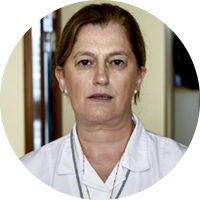
She is 55 years old and has been a nurse for over 30 years at the Northern Lisbon University Hospital Centre, Santa Maria.
She has been head nurse for 7 years, at the Gastroenterology and Hepatology Intensive Care Unit. Since October 2020, she has been working at the Covid Intensive Care Unit, which means treating patients infected with SARS-CoV- 2 in isolation wards.
The UCIGEH Unit (Gastroenterology and Hepatology Intensive Care Unit) was converted to UNEIC (Critical Inpatient Structural Unit) in April 2020 for Covid patients. Due to the drop in cases after the first pandemic wave, it became the Multipurpose Intensive Care Unit. This is the unit that brings together the usual team, with more professionals from other areas and other clinical diversities.
The woman described in this article is called Dulce Freitas. When I was told that she was one of the “great” leaders of the Hospital, I recalled my childhood image that a head nurse is always tough and unkind in order to withstand all the clashes. Such an obvious contradiction deserves to be mentioned here.
She has fair hair, and her words are objective and affable. This does not prevent her from expressing herself as she feels and thinks. I quickly realise that she does not express herself using too many physical gestures of affection, but she shows empathy and care in tangible and pragmatic actions. Assertiveness does not take away any pleasantness even in the most impactful decisions.
Where does this discernment come from, since it was not influenced by the path of her own family? I think as I watch and listen to her and I notice natural leadership in her, without needing to impose herself.
Being a nurse has always been her first option. This belief also describes all other ways of going through life. In year 10, she was not included in the Health group, the only area she agreed to study. The argument was that the Health class was already full. She was placed in the management area. She didn't care about the arguments and made it clear that it was either Health or she would change school. She stayed in Health, at the same School. She took her specialty in the medical-surgical field and did a postgraduate course in health service management.
After a first phase of her career at Cruz Vermelha Hospital, she moved to Santa Maria to work in the ER, and stayed there for 8 years. That was always the goal, working on the edge of the abyss, where risk and danger remind us of the volatility of life. After those 8 years, she left the ER because for her it was her second job. Her other job was in intensive care. These 8 years at the ER were a great school of life and a way of training for the management of emotions and human decisions. She was now taking on a new dual mission, caring for patients in Neurosurgery Intensive Care and making clinical referrals to patients through the health insurer Médis.
Later, she left this dual role, dedicating herself entirely to the Gastroenterology and Hepatology Intensive Care Unit. She has been there for 15 years. She joined as a second element, but became the head nurse 7 years ago when the then head nurse (Conceição Sousa) retired. She accepted the invitation with some caution and fear. "Why?", I ask, intrigued, in the face of a strong personality that conveys so much safety.
She always wanted to treat and be with patients. Taking on the role of head nurse took her further away from direct human contact and being a manager, which was now the main task, meant a lonely and demanding position.
Convinced of her personality and of her greatest motivational drives, she tries never to lose her direct connection to patients, contacting the ground whenever possible, which mirrors the reality that has always inspired her. She explains that it is very complicated to manage time, as human resources reflect well the current economic and pandemic times. She also makes a point of explaining that she is not a career head nurse, but an invited head nurse. She is married to an intensive care physician and has an 18-year-old daughter.
Adrenaline moves her but, strangely, if she takes the same straight line for too long, even if it is on the razor's edge, she feels she needs more oxygen, because that adrenaline starts to become a safe routine. The nurse who took care of the most serious cases, is the same nurse who embraced with great creativity and dynamism the works of the Gastroenterology Service, to transform it into a Covid area. It all seems simple when she says "it was necessary to adapt the furniture and move it around, choose the right times for the new pieces to come in and for the old ones to go". She does not allow herself to be conquered by fatigue or time. She has a very strong personality and is already devising plan B when we are all still thinking about plan A.
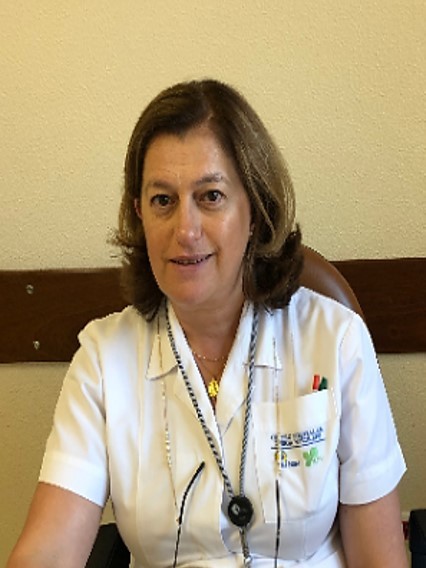
For someone who has gone through a few very difficult transitions, were you prepared for the scenario of many ambulances outside the hospital and the wards filled with patients?
Dulce Freitas: It was a challenge, because the truth is that I had been working at cruising speed for some years. At the Gastroenterology Intensive Care, we were working with a lot of stability and I sometimes need change and adrenaline to feel motivated. The change was good for me. So, this whole year has been a huge challenge because I have always been very involved in Intensive Care. My journey has been like this, so anything that changes it is seen as a challenge. But adapting is always difficult, because it brings about violent changes, which require us to change violently. The point is that if we don't adapt, we won't survive.
Does this adaptation force you to learn almost from scratch?
Dulce Freitas: A permanent learning and adaptation, a daily adjustment of what is done, how it is done. So yes, it is almost learning from scratch.
Regarding this last adaptation that required transforming your area into an exclusive Covid one, have you ever thought whether you were prepared to manage an unknown reality?
Dulce Freitas: No really! I was already prepared. Because I had everything organized in my head. Me and my team, this is always a team effort, I don't do anything alone. I had mentally organized everything according to the Institution's rules, including all that came out of the Infection Committee, the Nursing Directorate and the Board of Directors. I pieced everything together and thought about what it would take to reach the goals. We had the support of the Hospital and of the teams from other services. The support was, in fact, mutual. We traced everything and when it was necessary to apply it, we did it. In October, when I was told that everything needed to be adjusted for Covid patients, I already knew what to do for our usual patients and how to receive new ones. In 12 hours we transformed the entire service into a Covid service. We removed uninfected patients and reduced the space to the minimum of necessary things, because rooms with infected patients must have the minimum of necessary things. In the morning, we removed the 5 "Covid free" patients and received the first infected patient at 5 pm. All this needed to be quick, because we were dealing with sick people. It was a great team effort, which also included the institution's technical support services, rectifying medical gas ramps, sockets, network points, changing furniture, among other things, not only tasks involving monitoring the patients.
Where does your instinct to care for others come from? And your assertiveness? Not everyone chooses nursing, as it implies performing, touching, often hurting in order to heal...
Dulce Freitas: Whenever I had a conviction, I went along the path that I thought was right and I didn't give up, I didn't let myself be overwhelmed by difficulties. Everything I chose was due to the fact that I felt I had a natural aptitude. There is a thirst for adrenaline, linked to some "control" of the situation. I must say that it is much easier to monitor and care for a patient in Intensive Care, than in a ward.
And why is that?
Dulce Freitas: In Intensive Care there is always a nurse in the room, the patients are never alone and they have all the equipment that monitor the patients regarding the cardiac part, blood pressure, saturation, or temperature. Thus, we are very close to them. In the wards, we are not so close to them anymore. It is much more challenging for me to be there and to control everything that is going on. It is difficult for me to have a patient closed in a room and not know what is going on with him.

That feeling of control is interesting. The truth is that things are not always in our hands. What do you feel when control escapes us?
Dulce Freitas: This control is an adrenaline rush and we always think that "will get round this ".
How do you deal with frustration when something goes wrong?
Dulce Freitas: It is horrible, when everything is expected to go well. We are all mortals and we know that the chance of survival for some patients is very low. In such cases, we accept "lightly" that the person dies, but always with the concern that he/she passes with dignity, without suffering or pain, with tranquillity and, if possible, that he/she will be able to say goodbye to the family. But there are unexpected situations.... A situation that marked me forever happened to me at the ER. I was part of the team that built and started the Multipurpose Intensive Care Unit. There was a teenager there who was hospitalized with a “mild clinical situation”. The area was divided into groups, the critical and less critical patients. This young woman was admitted and her situation quickly became more complicated. She had to be hospitalized and in the middle of the night she suffered cardiorespiratory arrest. A healthy young woman is not supposed to die. Faced with that scenario, I remember saying "we have to revive her, she cannot die, this cannot happen, she is very young". You see, her mother left her in the hospital with a mild medical condition, and how were we going to lose someone like that? We spent an hour reviving her, we were all desperate. It is just like receiving polytraumatized children and suddenly they die. It is not a natural thing to happen.
Can the situation be reversed?
Dulce Freitas: It's difficult. You cannot imagine the anguish and revolt that we felt with the situation of this teenager. It should not really happen. It goes against everything in nature. Another example is that of a 4 year old child brought to me at the ER. The child was playing next to her grandmother and fell, hitting her head. She had cardiopulmonary arrest and we were unable to resuscitate her. These situations are horrible! They mark us and when it happens we just want to leave, give up, never come back. Then we are left with a huge determination that it cannot happen again, and a terrible frustration because these things should not happen, they are not natural...
What is the role of a leader when she feels her team is breaking down? And there are several scenarios. It is breaking down because there is not enough knowledge to allow saving a body that is failing. What is it like to be a leader of people who are underpaid and work very long hours and feel the apathy of tiredness. How do you motivate a team to continue to work as hard as they can?
Dulce Freitas: It is very complex, perhaps the biggest challenge as leaders and bosses. The truth is that there is no recipe, or strategy. Since we became a Covid service, we have had a great shortage of personnel, we have extra monthly shifts with an average of 80/90 fewer monthly shifts. The teams are demoralized and tired of working, very tired. And they ask, "who's going to do this for us?" and we know that there are no nurses, this hospital has no more nurses. Those who enter are proportional to those who leave, there are no more people, so we are aware that we have to do it, to continue. As a boss I ask for shifts, but I have to give something in return. So my biggest concern is that people like being here. Right now, I say that I have a 5-star team, because despite everything, this group of people likes to be together and has learned to work and have a good time. They and I grew up together. I, because I ask for quality work, professionalism, but I also give them the possibility to change shifts, to substitute schedules so that they can go away for days, rest; we always try to make people enjoy to be here. But there are no motivational recipes, there are many motivation courses, but they are not studied externally. There are no recipes in the book that tell us how and what to do. It is necessary to know how to look at each one differently in isolation. And knowing that this profession has many risks, it is painful and we work long hours, but we try to give and receive.
How does this professional woman manage the family side as well? There is a daughter to look after, a house to manage, a marriage that continues. It is not a less important role. How do you manage both?
Dulce Freitas: I have kept the personal side apart from the professional one. But in this situation since the pandemic began, everything became much more complex because I spend many hours at the Hospital, I go in the evening and leave in the evening and come in at weekends. My daughter is studying remotely at home. But I am fortunate to have a husband who has been able to spend more time outside the hospital to be with our daughter. Sometimes we order dinner out, because I just don't have the patience to cook, I am exhausted when I get home. I lost my cleaning lady too, the last thing that I needed. (she laughs, in a good mood). I ended up splitting tasks at home with my daughter. I don't overload her, but she helps. And then I tried to disconnect from the concept of a very clean and tidy house, it wasn't even possible, it was necessary to establish priorities, and the family helped a lot in that. My husband helped a lot and our daughter also adapted to the new tasks.

You have told me about your schedules, how you start at the Hospital at 8 am and, during peaks like the one in January, you leave 12 hours later. To be ready at 8 am for work, it means that you left the house quite early and arrived late. Being a head nurse and also a mother, it is not difficult to realize that in order to be a professional, you need to be less attentive. Do you think about it at all?
Dulce Freitas: In the beginning, when it all started, I left her a note daily at her work desk. Every day there was a message, precisely for her to feel the connection and not feel "abandoned". Later, the conversations between me and her father would always deal with the same topic, the sick and she asked us not to speak about the hospital at dinner. She really insisted. She always asks us to change the topic, I think she needs to feel that at least when we are closer to her.
Regarding your emotional balance, how do you balance decision making and reason with emotions? Where do you place emotion amidst management?
Dulce Freitas: It is very difficult to separate things... I do not know... (she is very thoughtful, but always calm) We are making choices, always letting reason weigh more. As the questions arise, we choose, step by step.
Your words about the reality in the Covid raises alarms again and point to the danger of a leaving the lockdown and that people forget what we have gone though. For those who are still on the ground and in view of your experience, how do you look to the near future? Can we get into a 4th wave soon?
Dulce Freitas: I sincerely think so. People are not going be responsible. They are tired of being at home and want freedom, without remembering what has happened. Perhaps it would have been beneficial for some people to come and volunteer and see what has been experienced here. I think we will have another wave, yes.
And does this mean that you are already thinking of a plan B to react to the new wave?
Dulce Freitas: Yes, I am! Even today I commented here at the Hospital that it is important not to close Services that were Covid, because this can quickly turn everything around and go wrong again. We are going to have a rise in cases, because most of the population is not vaccinated and wants to go for a walk and return en masse to commercial spaces and socialize. And the delay in the AstraZeneca vaccine further hindered the process. People are not immunized and behave as if nothing has happened. I see many people on the street without a mask. As soon as the sun is here, the families will all go for a walk, socialize. Many people have lost family members, so many people have been lost and it seems that they have learned nothing. And on social media they still accuse us of being liars and of falsifying reality.
The problem is that we are not just talking about the deniers. We are talking about a majority that, as it came out unscathed, does not seem to care about the consequences.
Dulce Freitas: It is very worrying. And they accuse us of profiting from this situation. They call us liars.
Does that offend you?
Dulce Freitas: It hurts a lot. I can only attribute these accusations to ignorance. But there is some malice because although they do not know what we have been through here, they do not want to know much about the truth of the facts. We commit our days, hours, part of ourselves and in exchange for very little. Suffice to talk about the shortage of staff and how we are underpaid. And do you think most want to know this? People don’t want to know. Many people do not deserve our dedication, they arrive and think that everything is due to them. We are publicly insulted, of course it hurts. We try to ignore it, because it does not deserve any other attitude. And it is not fair to use the argument that this is our job. It certainly is, but will it be at all costs? Not everything goes! We are talking about lives and we work hard for 30/40 years waiting to be able to receive a pension.
Even so, 30 years after, I believe I know your answer to the question if you regret the path you have chosen...
Dulce Freitas: I don't regret it at all. I don't regret my profession, or the choices I made, or my path. I know that I make mistakes and that I forget some things, not everything I did was always good, but I always did it the way I thought was right. And when I did badly I learned and tried not making that mistake again. And I know how to apologize when I make mistakes, I know how to recognize and I always try to solve everything.
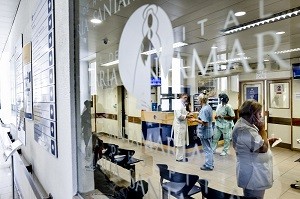
At the highest peak of the pandemic, Santa Maria had 7 Units exclusively for Covid patients. Currently, only three are converted for this purpose. During the month of January, she worked 12 hours per day to ensure the safety of the team and its patients. Little time has passed and looking at what happened a month and a half ago, Head Nurse Dulce describes the rush of the teams. Perhaps an image of bees working together in the same hive is a good analogy. Everything had to be done when the sell by date had gone, the scenario was closer to madness and chaos than to harmony.
She is not physically affectionate, but she has a steady serenity in her eyes, which reassures anyone who may be afraid of something. Her zeal for the others is attested when, at the end of our conversation, she says that patients kept in a closed space and deprived of visits worry her. She has the habit of transposing to her what happens to others and thinks how she would feel alone surrounded by strangers, in a hospital with endless rooms. Whenever possible, they let the families come in to see their patients, in fact, only one family member, but they try hard to enable the visit Sometimes video calls are made to bring the family closer, but the patients are ventilated and without great reaction, it is just painful for a family member to see such an image on the phone.
Her daily scenario is to live with intubated people connected to machines, silent and dependent on being treated very well. Dulce resents this picture of loneliness for the patient himself. Most cases recover.
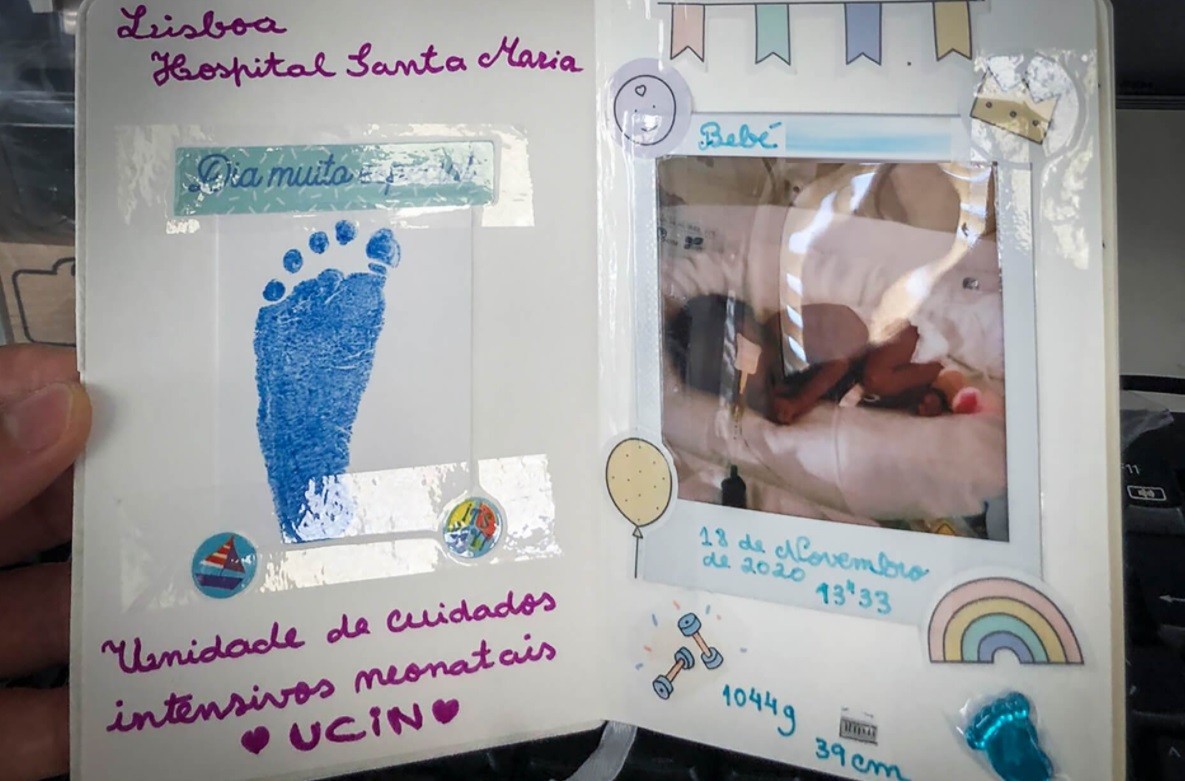
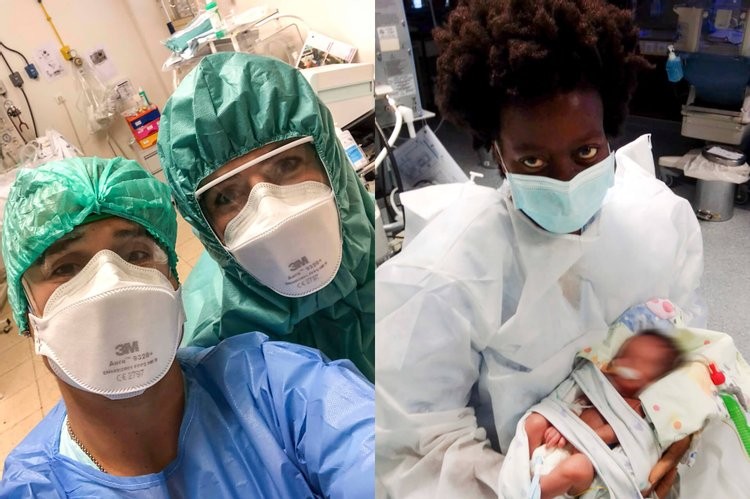
The famous case of the mother infected with Covid and in a coma, Elisângela, was an example of this human dedication of the Hospital's teams. Elisângela was in the care of nurse Dulce's team and was monitored as if she were part of the family. After the caesarean section and 12 days in a coma, she survived and restored her strength thanks to the care of this team. When she woke up, she was surrounded by photographs and had a journal about everything that had happened to her baby Neves in the first moments of life. She admits that many times she thought she was going to lose this young mother with the baby still in her belly. They bonded to that moment in the same proportion that they watched the screens that showed the CTG permanently giving feedback on the belly that showed the baby's life.
What drives Dulce Freitas in all challenges is the challenge of victory and the fight against what may be destined for the person's life. What makes her be there every day at 8 am and move between the most delicate areas, is the confrontation with risk and the fight against its victory.
If the worst comes back, we know that this head nurse has already outlined the whole action plan in her head. And we know that if this is the case, she will again leave love messages to her daughter and move the image of the perfect house into the background. Because above all, she fights for who she is and for her convictions. She fights when Nature wants to take away someone she believes is not ready to leave. She fights for the quality of everyone's health, even when hers is at risk. But it was all as planned, the way she chose, because she wanted it that way.
Joana Sousa
Editorial Team


